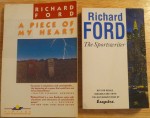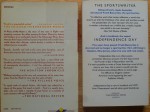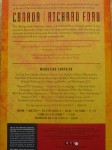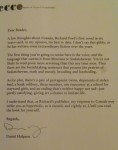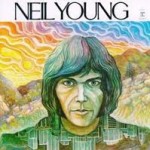In Depth Profile of CBC Radio’s Jian Ghomeshi
July 25 Update: Jian Ghomeshi of CBC Radio’s ‘Q’ has now also been the subject of a NY Times profile, and here’s a link to it. I’m really pleased to see Jian and his program making so much headway in New York City, and throughout the States.
—
CBC Radio One’s morning program ‘Q‘ is one of my favorite shows on any radio network. Though normally produced at CBC’s headquarters in Toronto, host Jian Ghomeshi and his producers occasionally take their show on the road, which allowed my son Ewan and I to attend a live taping held in WNYC’s Greene Space in 2011. That night Jian interviewed guests Joy Behar and Fran Leibowitz and the band The National played too. He was very personable when we talked afterward, and pleased to meet U.S. listeners like us. That visit to NY was a prologue as the show has a spot on WNYC’s evening schedule this summer, 10 PM on the FM frequency, 93.9. I still listen on the Internet most mornings while at my desk, but it’s also great that I can hear it in the evenings if I missed it earlier.
Last month, during the NXNE festival, when fans of CBC Radio 3, the indie rock outpost of CBC, got a tour of CBC HQs, producer Pedro Mendes and Radio 3 host Grant Lawrence brought Jian out to meet the group. He was charming, and when I (re-) introduced myself he remembered having met me and Ewan in NY more than a year ago. That afternoon I took this photo of Jian, in the soccer jersey, and Grant, in flannel. 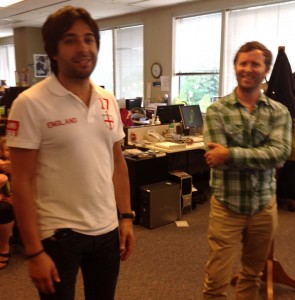
Today I was glad to read a profile of Jian in the Globe & Mail from last weekend. Reporter Brad Wheeler adopts a somewhat snarky tone, but overall, it’s a good article, with info like this:
“Last month, Ghomeshi won the Gold Award for best talk-show host at the New York Festivals International Radio Awards. Q, the popular daily arts, entertainment and culture magazine he hosts with aplomb and a soothing baritone, air[ing] on 120 public radio stations south of the border, including in major markets such as New York, Chicago and San Diego. . . . Q’s unprecedented American victories are explainable. The show takes pop culture seriously, attracts A-list guests, engages in lively debate and manages a rhythmic flow of its varied content. You have a host in Ghomeshi who comes with an exotic cultural background, a radio-friendly baritone, and who’s cocky and well-read enough to take on a variety of issues and interview subjects in an in-depth way. ‘The type of show Jian does draws on a lot aspects of the host’s personality,’ says Robert Harris, long-time CBC personality and producer. ‘It stretches your brain power, and the audience reacts to it.’ . . . . Some of the new listeners no doubt react to Q’s hip list of musical guests. Moreover, the artists and labels themselves are on board. Would rapper andQ guest Jay-Z have done Radio One five years ago? No chance. ‘American managers are reaching out to me, wanting to know which shows they should do,’ says Patrick Sambrook, a prominent artists’ manager whose clients include Kathleen Edwards and Sarah Harmer. ‘Q is on the top of the list for international artists coming to Canada. It’s the show that you want to be on.’”
To this I would add that ‘Q’ broadcast a nearly one-hour interview with Neil Young and Daniel Lanois, when “LeNoise” was released last year, a rare bit of media access that Neil chose to give ‘Q.’ More recently, Jian interviewed Chinese dissident artist, Ai Weiwei, who chose to appear on ‘Q’ despite continuing threats to his freedom by the Chinese government. I haven’t heard Ai WeiWei on any NPR programs. Clearly, ‘Q’ has become a go-to show for artists, authors, and many public figures. If you enjoy filling your day with intelligent talk radio, I recommend you listen to this terrific program. Being nowhere near Canadian air waves doesn’t matter, as it’s easy to listen to CBC on the Web.
Jian, whose family comes orginally from Iran, moved from England to Canada when he was fourteen is writing a book, 1982, about his teenage obsession with David Bowie, which will be published in Canada, and he told me, the U.S.

